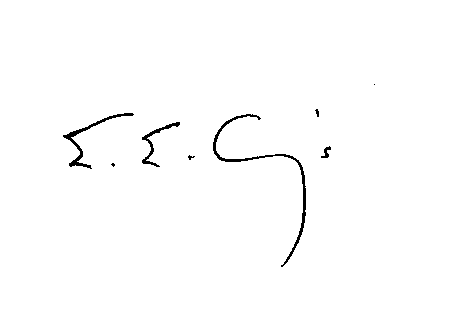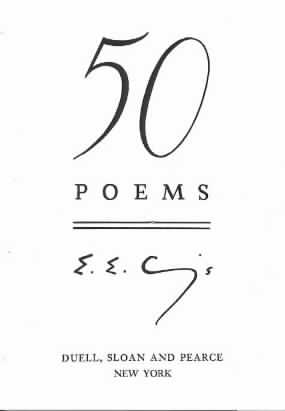
It may at first seem of little import, but for a poet who paid such exacting attention to typography, it must be said once and for all that his name should be written and printed with the usual capital letters in their usual places: "E. E. Cummings.''
Let us dispose, first of all, of the usual reaction when his name is mentioned in conversation: "Oh, isn't he the poet who never uses capitals?" Even a casual look at his poems shows that of course he uses capitals—he uses them frequently, albeit not always conventionally. The same goes for spacing, word and line breaks, parentheses, and punctuation, not to mention grammar and syntax.
What probably accounts for the common misperception that he is a lowercase poet is his usual printing of "I" as "i." Interestingly, he wrote in a letter to his mother, September 3, 1925 (Selected Letters, F. W. Dupee and George Stade, eds., 1969, pp. 108-9): "I am a small eye poet." Notice that he capitalizes the first-person singular, distinguishing between the writer of the letter and the writer of the poetry. And in his letters he most frequently used the uppercase form, with his signature at the bottom in caps, thus:
This comes from a letter to me dated January 13, 1949.

The following comes from the title page of 50 POEMS (1940), as you can see:

Subsequent publishers, however, fell into the habit of using lowercase for Cummings' name. Harcourt, Brace, however, in their 1954 edition of Poems 1923-1954, placed a similar signature on the cover and capitalized the initial letters of the poet's name on the title page.
However this may be, I hadn't paid much attention to how publishers designed their covers and title pages, assuming that the author had little influence in such matters, until I sent Marion Moorehouse, the poet's widow, a copy of my second book on Cummings (Southern Illinois, 1964), which was not long after the poet's death in 1962. Although I myself always spelled his name with the usual caps, since my first book (Hopkins, 1960) used the lowercase form on the cover and title page, and since neither he nor Marion had complained at that time, I was somewhat taken aback when she wrote me, in April of 1964, "you should not have allowed H. Moore to make such a stupid & childish statement about Cummings & his signature."
The problem, then, was not so much with the cover and title page as with Harry T. Moore's Preface, which began:
In going over the jacket
design for your book on Cummings—and looking back over the galleys—I find
myself perplexed by the problem of decapitalizing Cummings' name.
Should it be done consistently
throughout? Please give me a rubric, if you can.
Our jacket front, jacket
flaps—and the spine of the book—now read e. e. cummings. Yet the text itself
reads E. E. Cummings. Do you find this a great disparity?
We are rushing last minute
details on the jacket and on the catalogue copy as well. I would
appreciate a return reply from you.
(Correspondence published
with permission of Southern Illinois University Press)
Dear Mr. Sternberg:
I talked with Mr. Moore
today. Naturally, he expressed great surprise, as I did to you when we
talked on the telephone, at Mrs. Cummings' reaction to the statement in
the catalogue description of your book and in Mr. Moore's Preface to the
book. Both of us hope that Mrs. Cummings will see the book and note especially
Mr. Moore's Preface. I gather that you have not received your author's
copies. When you do—which should be in a day or two now—would you please
forward a copy to Mrs. Cummings? I will replace it with another copy to
you.
Certainly, Mr. Moore's
Preface is very friendly toward E. E. Cummings' work. I believe it can
be said that he is an admirer. He describes Cummings' poetry and prose
in glowing terms. As much as twenty years ago Mr. Moore first called attention
to Cummings' contributions to modern literature.
Hence I think it can be
said that Mr. Moore regards the point to which Mrs. Cummings appears to
have objected as a minor point of punctuation. Obviously, he meant no harm.
Mr. Moore cannot recall offhand his source of the statement, but with so
distinguished critic and scholar as Mr. Moore one can feel sure, I believe,
that there is an original source. Perhaps one should search it out. In
any event, the decapitalization of Cummings' name has been commonly accepted
over a period of years.
You will recall our correspondence
on the titling of your book. As a publisher, I felt that the practice of
decapitalizing Cummings' name was so commonly used and accepted we had
no choice but to follow common usage on the title page and jacket at least,
especially since you yourself, a Cummings authority, were uncertain on
the point of whether or not to capitalize here, and since your previous
book had not.
Therefore, I feel that
the point, if indeed one does exist, is a minor one. I gather that you
agree. I hope Mrs. Cummings
will, too, when she has
a chance to study Mr. Moore's Preface. In my opinion, to call attention
to the statement by way of an errata slip in the book—and review copies
have already gone out of course—would not serve anyone's interest at this
point. However, should we reprint your book, we will be happy to make a
revision.
Let us look at it this
way: the Preface contains a factual error, and we are going to give
it wide currency if we allow the books to go out uncorrected.
All the other issues are
side issues, it seems to me. Whether Mrs. Cummings is making a mountain
out of mole hill is beside the point: that she says it is an error is the
crucial thing, and not whether she is upset about it or should be upset
about it. That Mr. Moore favors cummings and that he is a distinguished
critic and scholar is of course taken for granted: the point is, however,
that one's reputation can only be enhanced by one's willingness to admit
a mistake. Certainly he must have had a source for his statement, and certainly
he meant no harm: but either he or Mrs. Cummings is wrong.
Whether or not we should
have used caps or lower case in the body of the book and /or in the title
page and jacket is also beside the point. I recall, however, no uncertainty
on my part: I said I preferred caps, that caps were more proper, but that
I would leave the choice up to you in designing the title page and jacket.
At the time, I had no explicit information from either Cummings or his
wife, and was going on what I knew about the way he signed his name and
what I felt about his philosophy of typography—that he could use
caps and lowercase as he wished, but that when others referred to him by
name they ought to use caps.
It is true that my previous
book uses lowercase on title page and jacket, and it is also true that
some of Cummings' own books do the same. But these things do not alter
the fact that, according to Mrs. Cummings, he did not have his name
legally put into lowercase,
and that it is an error to say so.
We are dealing, then,
not with the question of how to style the name, nor with anybody's feeling
about it, but rather with a statement of fact which has turned out to be
wrong. Should it not be corrected solely on this basis?
I have received the books,
and it looks like a handsome and readable job to me. Your word about advance
sales is also very heartening. But I am betwixt and between, an innocent
party in this business, and unwilling to rub either side the wrong way,
so I don't know whether I should give Mrs. Cummings a copy or not. What
would you think of Mr. Moore sending her one, with a note or something?
Or better still, an errata slip?
You will be pleased to
know that your E. E. Cummings will go into its third printing in December.
All references, including
those in Professor Moore's Preface, to e. e. cummings will be corrected
to caps; that includes the title page. The jacket will be redesigned to
conform to the new Crosscurrents series format and the blurb will be reset.
At that time your biography can be updated if you wish to send me new information.
We will also need a brief biography of Cummings for the back jacket. This
should be 20 lines in length, 57 characters to the line.
If you have found any
errors in the original printing of the text we would like to correct them
by the insertion of an errata page. For the page I will need: book-page
number, line number, error, and correction.
May I please have all
this material by October 15.
Ten years later, plans were subsequently afoot for the fourth, Arcturus Paperback, edition in September 1980, and I received this letter from Mary Hastings, Press Secretary, on December 8, 1979:
We are planning to bring
out your book, "e. e. cummings: The Growth of a Writer" in paperback in
our Arcturus Books line late next summer, and wonder if you have a copy
of the book that we might use for this purpose. Also, if you have any errata
it would be most helpful.
I look forward to hearing
from you soon.
Best wishes for the holiday
season.
I must confess that my own attention had turned elsewhere during those intervening years, and that I apparently failed to enter the fray once again. After the founding of the original SPRING, however, Forrest reminded us that Cummings' name should have the usual caps, and so we hope it will continue.
We hereby proclaim it to be so, and we hope
the dismal lowercase custom will disappear from the face of the earth.
At the very least, this journal henceforth will print it properly in all
of its contents.
For more on the capitalization of Cummings'
name, see Norman Friedman's follow-up article, "Not
'e. e. cummings' REVISITED," Spring 5 (1996):
41-43].
Contents Issue 1